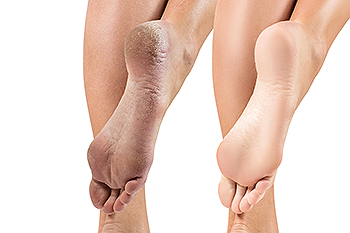
The most obvious reason a patient can get cracked heels is by having dry skin. Additional reasons that this uncomfortable foot condition can develop include standing on hard surfaces for long periods of time during the day, being overweight, and having foot problems that may increase heel pressure. It can happen to people who wear flip-flops or open backed shoes, which can cause the fat pads in the heel to expand sideways. Existing medical conditions may cause cracked heels. These can include psoriasis, eczema, or diabetes. Cracked heels can cause pain and discomfort, and may become infected if bacteria enters the body through the cracks. Effective prevention methods include wearing shoes that have a closed back and fit correctly, and frequently applying a good moisturizer throughout the day. Many people choose to wear padded socks which may help to prevent injuries to the affected foot. If you have cracked heels, it is suggested that you confer with a podiatrist who can guide you toward the treatment that is correct for you.
Cracked heels are unsightly and can cause further damage to your shoes and feet. If you have any concerns, contact Bill Brown, DPM from Brown Podiatry. Our doctor can provide the care you need to keep you pain-free and on your feet.
Cracked Heels
Cracked heels appear unappealing and can make it harder for you walk around in sandals. Aside from looking unpleasant, cracked heels can also tear stockings, socks, and wear out your shoes. There are several methods to help restore a cracked heel and prevent further damage.
How Do You Get Them?
Dry skin is the number one culprit in creating cracked heels. Many athletes, walkers, joggers, and even swimmers suffer from cracked heels. Age and skin oil production play a role to getting cracked heels as well.
Promote Healing
Over the counter medicines can help, especially for those that need instant relief or who suffer from chronic dry feet.
Wear Socks – Wearing socks with medicated creams helps lock in moisture.
Moisturizers – Applying both day and night will help alleviate dryness which causes cracking.
Pumice Stones – These exfoliate and remove dead skin, which allows for smoother moisturizer application and better absorption into the skin.
Change in Diet
Eating healthy with a well-balanced diet will give the skin a fresh and radiant look. Your body responds to the kinds of food you ingest. Omega-3 fatty acids and zinc supplements can also revitalize skin tissue.
Most importantly, seek professional help if unsure how to proceed in treating cracked heels. A podiatrist will help you with any questions or information needed.
If you have any questions, please feel free to contact our office located in Scranton, PA . We offer the newest diagnostic and treatment technologies for all your foot care needs.
